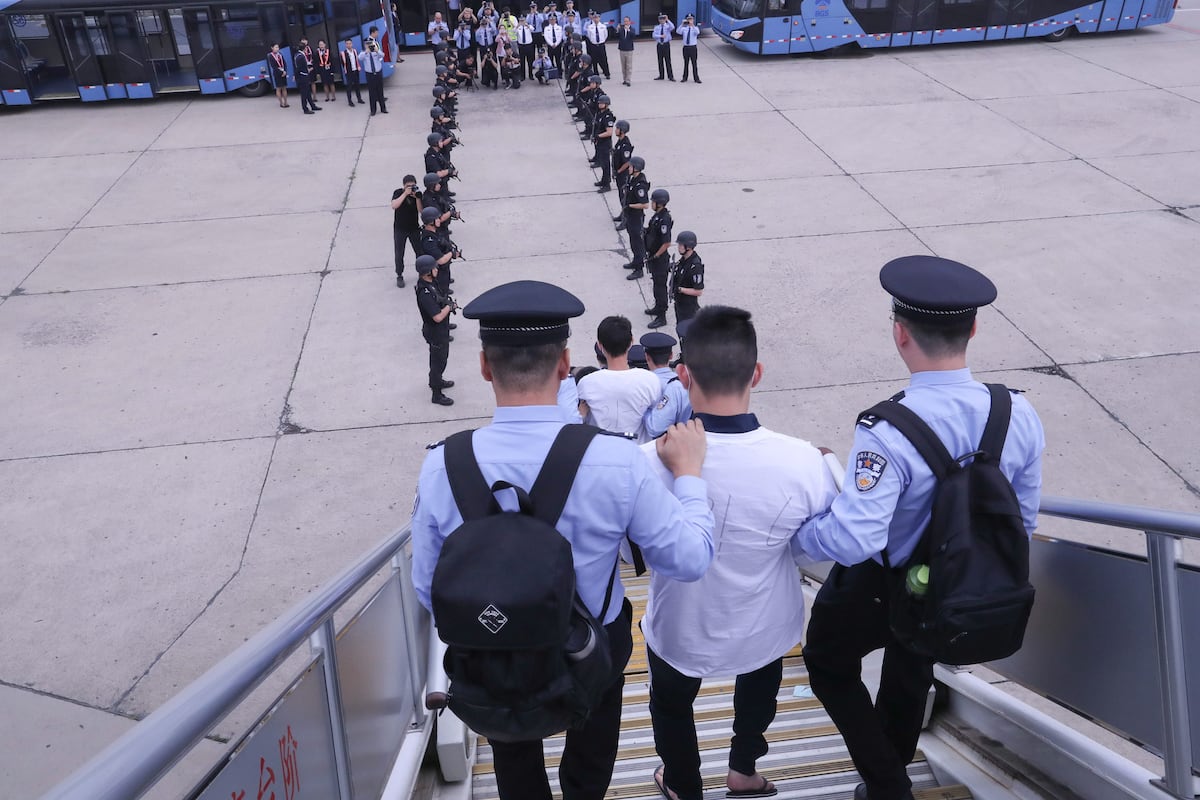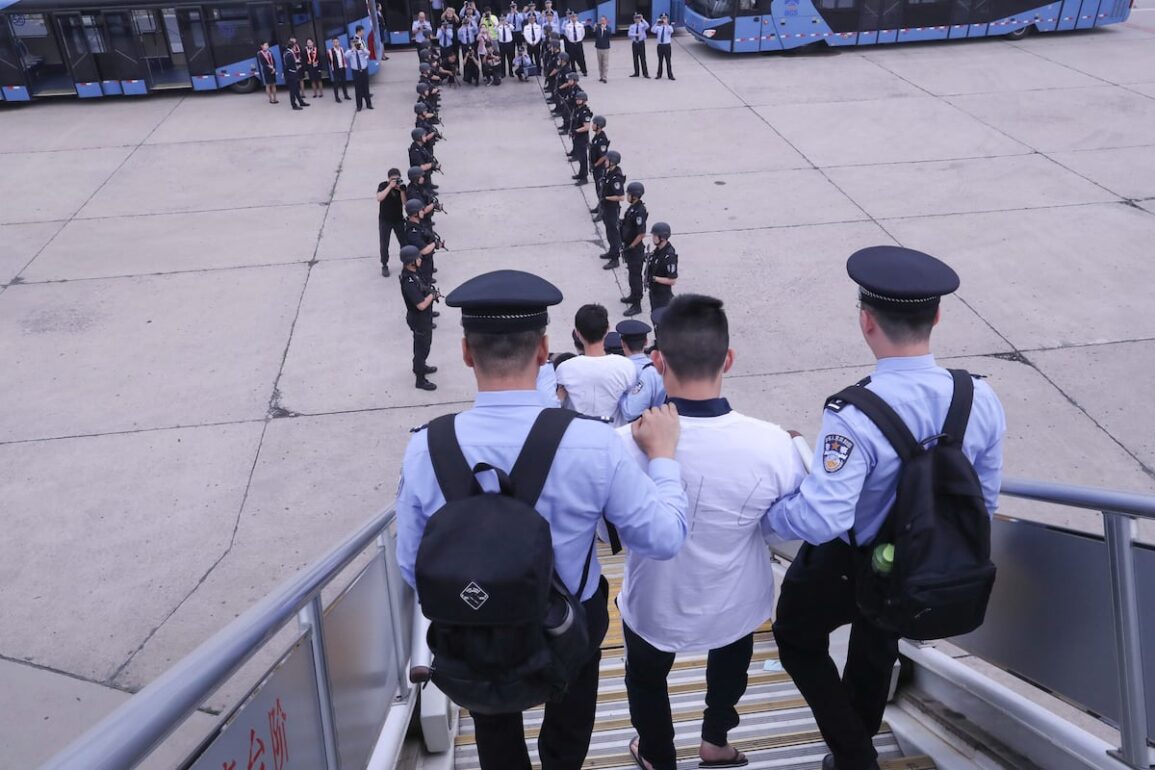
Since the European Court of Human Rights’ ruling prohibiting Poland from extraditing a Taiwanese man to China became final in January 2023, Spain is the only major European country that has continued to hand over — albeit in spurts — citizens wanted by Beijing.
In 2023 and 2024, the Spanish government authorized nine extraditions to continue through judicial channels, and at least one person has already been handed over to Chinese authorities. On October 29, 2024, after almost two years in prison, this 41-year-old man, wanted for fraud, was released from Madrid’s Soto del Real prison to be extradited to the People’s Republic of China. “I have no information about his situation or treatment in China, except that he is awaiting trial,” confirms the lawyer who defended him during the process, Carlos Aguirre de Cárcer.
The lack of guarantees that extradited individuals would receive humane and fair treatment in China was the reason why the European Court of Human Rights (ECHR) prohibited Poland from extraditing Taiwanese Hung Tao Liu in a landmark judgment, Liu v. Poland. Reports by the United Nations and non-governmental organizations such as Amnesty International found, in the eyes of the seven judges, “the use of torture and ill-treatment” in Chinese prisons and detention centers “to such an extent that it may amount to a situation of generalized violence.”
Consequently, the ECHR exempted Liu from having to prove a specific personal risk, given that the extradition request indicated that, once in China, he would be placed in a detention center, which was “sufficient” to deny the extradition. “An individual requesting protection must be guaranteed the benefit of the doubt,” reads the judgment of October 6, 2022.
Since the ruling became final in January 2023, Germany, France, Italy, the United Kingdom, Sweden, Belgium, Austria, the Netherlands and Norway have not handed over any person wanted by the Chinese authorities, as confirmed to the International Consortium of Investigative Journalists (ICIJ) by various authorities in these countries within the framework of China Targets, an investigation coordinated by the ICIJ, in which EL PAÍS participate.
However, both the Spanish High Court, the judicial body with authority over extraditions, and the Spanish government, which has the final say in this area, maintain that the decision to extradite someone or not must be made based on the specific circumstances of each case, as this newspaper has confirmed through government sources and a dozen court rulings. “Spain has had an extradition treaty with China since 2005 that contains guarantees such as the non-application of the death penalty,” argues a spokesperson for the Ministry of the Presidency, Justice and Parliamentary Relations. “We are one of the few EU countries that has an extradition treaty with China, which means there is a legal basis and guarantees,” the same sources state.
Laura Harth, China director of Safeguard Defenders, a human rights group whose reports some judges at the High Court have cited in their rulings, finds it “astonishing” that a court under the jurisdiction of the Council of Europe — “which includes Spanish courts” — should, in her interpretation, “so easily ignore the conclusions of the ECHR and approve extraditions to China.” At the time of speaking to EL PAÍS, Safeguard Defenders, which monitors and opposes extraditions, had not recorded any extraditions from Europe to China in the past two years.
A “verbal” guarantee
Liu had arrived in Poland fleeing Spain, where he lived. In December 2016, the Chinese government issued a warrant through Interpol for him and more than 200 other Taiwanese citizens, accusing them of a massive telephone scam. After the Constitutional Court denied them protection, 220 Taiwanese detained in Spain were handed over to China, according to ministry data. Having fled Spain, Liu was arrested in August 2017 and lost every court case in Poland. But he ended up protected by Strasbourg, the city where the European Court is based.
Following the current doctrine of the Spanish Constitutional Court, the High Court’s interpretation softens the ruling of the European Court of Human Rights: it does not interpret Strasbourg as having prohibited extraditions to China while the “situation of generalized violence” against its detainees persists, but rather that the Beijing regime must be required in each case to guarantee that the fundamental rights of those surrendered will be respected. And the surrender must be made conditional on such a guarantee.
And what does this guarantee consist of? In a statement that the Ministry of Foreign Affairs requests in a “verbal note” to the Chinese embassy in Madrid, according to a document to which this newspaper has had access. The ministry requests that “the Chinese authorities provide this guarantee”: that is, in the event the person is handed over, the document states, “the fundamental human rights of the person sought will not be violated, nor will they be subjected to ill-treatment, in the sense established in the judgment of October 6, 2022, of the European Court of Human Rights.” In this case, the person sought was an English teacher; China did not submit the guarantee on time, and the court rejected the extradition.
At least four other extraditions have been rejected by the court because they violated the treaty requirements in one way or another. Luis Chabaneix, founder and director of a Madrid-based firm specializing in extraditions that has managed to stop two extraditions to China in extremis in recent months, believes that, despite the extradition treaty and the alignment of interests that may exist between governments — Spanish Prime Minister Pedro Sánchez has traveled to China three times on official visits — “deep down, judges are almost ashamed to send someone there” and agree to suspend them for a variety of reasons.
Sometimes, however, the reasons run much deeper. Chabaneix’s legal firm defended a Chinese businessman detained in Marbella and wanted by Beijing for an alleged corporate crime. The case met all the formal requirements, but Chabaneix claimed that the accusation had been fabricated using a partner’s statement obtained under torture.
The partner, who currently lives in the United States, testified in writing before the Spanish High Court that he spent 14 months imprisoned in the Beijing Municipal Security Bureau “sleeping on the floor, with the lights permanently on, frequently subjected to physical punishment, coercion, and insinuation to fabricate false evidence against himself and the defendant,” according to the ruling by the Third Section of the Criminal Chamber of the High Court.
All of this occurred during the same time that the Spanish government was demanding China guarantee in writing that it would respect the human rights of the English teacher it was seeking to extradite.
Origin and destination
The plenary of the High Court maintains a majority position in favor of extraditions subject to these guarantees, although not without controversy. At least three judges have issued dissenting opinions against the softened interpretation in Liu v. Poland.
Judge Ana Revuelta interprets the Strasbourg judgment as holding that China’s declarations “are merely formal, without any guarantee that the courts [can] obtain the conviction that [they are] sufficient to safeguard the right [not to] be subjected to inhuman or degrading treatment,” she states in the dissenting opinion to which Judge Francisco Javier Viera adhered. In another dissenting opinion, Judge José Ricardo de Prado also denounced that the assessment of the sufficiency of the guarantee was left in the hands of the Spanish government: “An inadmissible surrender of jurisdictional matters in favor of politics,” he stated.
For Carlos Bautista, who served as an extradition prosecutor at the High Court for many years and now works at the Chabenaix law firm, the “fundamental” thing is that the ECHR has not issued any further pronouncements since Liu v. Poland. “And above all, it has not issued any further pronouncements to clarify whether its doctrine is being misunderstood […] Liu has been interpreted in Spain to mean that guarantees must be demanded regarding detention centers. But what Liu says is that no one can be handed over. So we’ll have to see if there is another pronouncement on extraditions to China in which the ECHR reiterates that it’s not that guarantees must be requested from China, but that the person cannot be handed over. In the meantime…”
Meanwhile, a new appeal originating in Spain and headed to Strasbourg is underway. In addition to the man extradited from the Soto del Real prison in October, the High Court had authorized at least a second extradition, but an appeal has managed to suspend it, for the time being. The extraditable man, another Chinese businessman being pursued by Beijing, is an asylum seeker with a son who holds Spanish nationality and the court ruled that the petition must wait for his request to be resolved, according to his lawyer, Inmaculada Cruz Guillén.
The case will reach Strasbourg via Rome, says Cruz Guillén. An Italian law firm has appealed the case to the ECHR from the Italian capital, where the European Convention on Human Rights, ratified by Spain in 1979, was signed in 1950.
Sign up for our weekly newsletter to get more English-language news coverage from EL PAÍS USA Edition
This post was originally published on this site be sure to check out more of their content.







